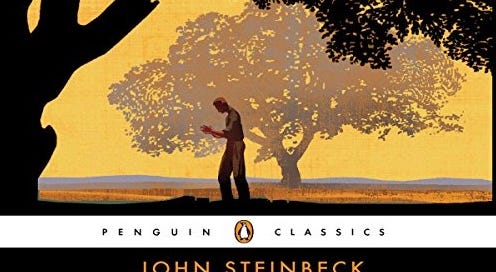BookLife Review by Carol O’Day: East of Eden (John Steinbeck, author)
Literary fiction, classic, American West, Salinas Valley, California, farming, ranching, good vs. evil, Cain and Abel, family secrets, multi-generational family story.
East of Eden is an epic story of two families, the Trasks and the Hamiltons, who settled in the Salinas Valley in California before the turn of the 20th century. Covering a span of decades from the end of the Civil War to World War I, East of Eden is biblical in its themes (Cain and Abel, good and evil, sin and forgiveness), and magnificent in its language, setting and character development. The title refers to the Biblical land of Nod, east of the Garden of Eden, the place to which Cain was banished to attempt to overcome the sin of killing his brother. East of Eden is among the best of Steinbeck’s masterful works; a classic that belongs on every bookshelf and reader’s reading list.
Samuel Hamilton is an early settler in the Salinas Valley, an Irish immigrant, who marries a pious wife and together they raise nine children. He settles on rocky, dry, mountain soil which yields little. He must rely on his ingenuity and hard work to make his life. Never wealthy, Samuel is rich in spirit and family and counts himself as blessed. Samuel is modeled on Steinbeck’s maternal grandfather.
Adam Trask makes his way to the West from Connecticut after a hard life, a stint in the U.S. Army and a rocky relationship with his brother Charles. With him is Cathy, his wife, whom he stumbled upon, beaten and bruised, and whom he nursed to health before marrying her. Cathy is an evil, narcissistic and psychopathic Jezebel character. She dallied with Adam’s brother; the paternity of her twin boys remains an unanswered question. Cathy has a violent and sordid past, unknown to Adam. She does not love Adam (or anyone), and schemes to abandon him after the birth of their sons. She does just that and sets up shop in the nearby town as a prostitute, slithering her way into the life of the brothel owner and acquiring it by nefarious means.
After Cathy’s betrayal, Samuel watches over Adam in his grief from afar, and befriends Adam’s Chinese American manservant, Lee. Samuel and Lee help Adam name the twin boys with an assist from the Bible, selecting for them the names Aron and Caleb. While Adam’s relationship with his own brother was overtly hostile and violent, Aron and Caleb are companionable, though competitive and different as night and day. Aron is studious and is eventually smitten first with young Abra and later with the ministry and priesthood. Caleb is a tortured soul, less scholarly than his brother and determined to learn the truth about his absent mother.
Steinbeck’s story is partly autobiographical, and rooted in the Salinas Valley where he grew up. Steinbeck’s description of the Salinas valley, its farms and ranches, its flora and fauna, rains and rivers and droughts, is a love language of its own and is wonderfully evocative. His gift for language places the reader squarely in the valley with its settlers, on the backs of horses traversing fields and feeling the parched throat that accompanies the dry hot months of drought that regularly visit the region. Steinbeck’s narrator regularly forecasts the future fortunes and growth of the area, its crops, westward migration of populations from the East on the railroads being built, and the rush to the gold mines in the adjacent northern California counties. He peoples the Salinas Valley with hard scrabble farmers and ranchers, blacksmiths, seamstresses, inventors, bankers, prostitutes and sheriffs. He colors it with greed and generosity and tests our tolerance for success and failure.
Steinbeck visits themes of sin and virtue, and success and failure through his characters, plot and setting with a skill that makes East of Eden a classic. Steinbeck artfully weaves another layer of scholarship into the perennial good versus evil battle. Lee explores the concept of “timshel” in the original biblical texts, and suggests that God did not command Cain to overcome the sin of killing his brother, but that Cain was told “thou mayest”; he posits that God offered Cain the choice to overcome his sins by living a life of good deeds. This notion dovetails with the very American notion of individual choice and will. In East of Eden, the battles of virtues and the passing of decades and generations moves swiftly under the pen of a master, and we turn the final page wishing for a sequel.
Support local bookstores and BookLife: Reviews for Readers by purchasing East of Eden using the link below:
For more book reviews and writing by Carol O’Day visit BookLife; Reviews for Readers on Substack, www.caroloday.substack.com.





